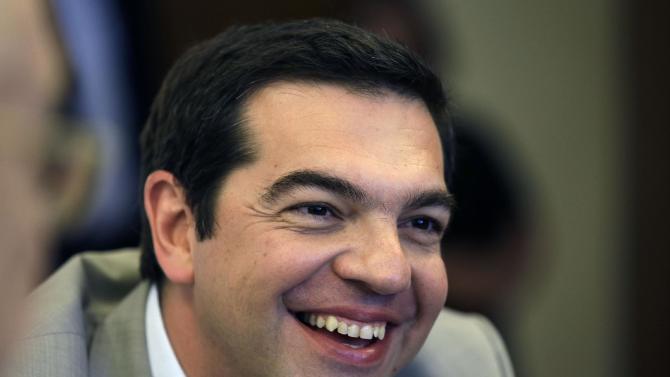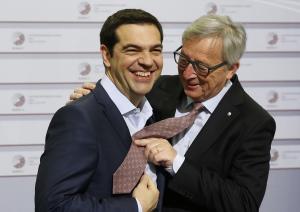Greek leader heads to Brussels to defend deal proposal
ATHENS, Greece (AP) — Greece's prime minister was heading to high-level meetings in Brussels on Wednesday to try to persuade the country's creditors to accept a proposal that might unlock much-delayed bailout loans and save the country from financial disaster.
With Greece running out of cash to make debt repayments as soon as Friday, Alexis Tsipras was to meet Wednesday evening with Jean Claude Juncker, the head of the European Union's executive Commission.
"I will go to ... explain to him that today more than ever it is necessary for the (creditor) institutions and mainly for the political leadership of Europe to sign up to realism," Tsipras said before leaving for Brussels.
"We need unity, we must avoid division," he said, speaking of Europe. "I am certain the political leadership of Europe will do what it must."
Jeroen Dijsselbloem, the eurozone's top financial official, was also heading to Brussels for the meeting, an official said.
In a sign that all sides are pushing harder for a solution after four months of fruitless negotiations, a conference call was planned between Tsipras, German Chancellor Angela Merkel and French President Francois Hollande, a French official said.
Both officials spoke on condition of anonymity because the plans had not been officially announced.
The Commission, however, dampened hopes of a breakthrough on Wednesday, with spokesman Margaritis Schinas saying "this is a first discussion, not a concluding one."
The news of the meeting was enough to encourage investors in Greece, where the main stock index was up 3.1 percent in noon trading.
Without bailout funds, Greece could default on its debts and crash out of the euro, the joint European currency, pushing Europe and potentially the global economy into turmoil.
Time is pressing, with Greece facing repayments to the IMF of 1.6 billion euros this month. The first installment of just over 300 million euros is due Friday, with other installments due on June 12, 16 and 19. Although it insists it intends to repay its debts, including Friday's, it is unclear whether Greece has the money left to do so.
Tsipras says he submitted his proposal to creditors on Monday night, as the leaders of France, Germany, the European Central Bank, International Monetary Fund and European Commission met in Berlin to discuss the situation.
He gave no details of his proposal on what fiscal reforms Greece would make in return for its final bailout installment, but Greece's creditors said much work remained to be done.
Tsipras' government has been struggling for months to reach a deal with the creditors to unlock the 7.2 billion euros ($8.1 billion) remaining in its bailout.
Greece needs the loans because it has been locked out of the international bond markets for five years as wary investors demand prohibitively high interest rates to lend it money. The country has not received new bailout loans since last August.
So far it has managed to scrape together enough to repay its debts by seizing the reserves of state enterprises, including municipalities, schools, embassies and hospitals. But those funds will not be enough to sustain the country through the summer, when it also faces large repayments to the ECB.
Elected in January on promises to repeal the deeply resented austerity measures Greece had to impose in return for its five-year bailout, Tsipras said the Greek side had made concessions during the negotiations.
Apart from negotiating with the creditors, Tsipras must also deal with hardliners from within his own party, some of whom openly say they prefer a rupture in negotiations and an exit from the euro, to capitulation on pre-election promises.
Government officials have said Athens has gone as far as it can in making concessions and that it is now up to Europe to meet Greece part of the way.
But Dijsselbloem countered on Tuesday that this was not a case of give and take and that while the types of reforms Greece must make can be discussed, their net impact on public finances was not negotiable.
"It is a misunderstanding that we have to meet one another half way. That is not our intention," he told Dutch radio.yahoonews





No comments:
Post a Comment